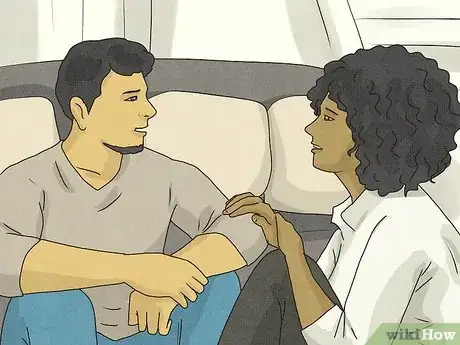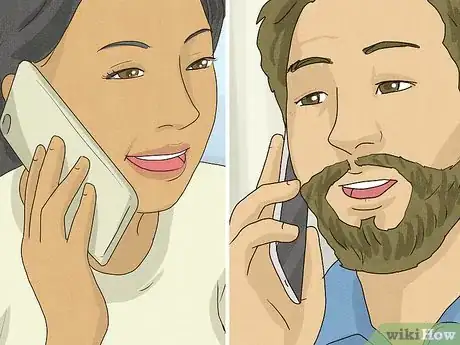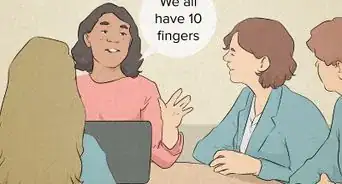This article was co-authored by Kelli Miller, LCSW, MSW and by wikiHow staff writer, Hunter Rising. Kelli Miller is a Psychotherapist based in Los Angeles, California. Kelli specializes in individual and couples therapy focusing on relationships, depression, anxiety, sexuality, communication, parenting, and more. Kelli also facilitates groups for those struggling with alcohol and drug addiction as well as anger management groups. She is the author of “Professor Kelli’s Guide to Finding a Husband” and the award-winning and best-selling book “Thriving with ADHD”. Kelli co-hosted an advice show on LA Talk Radio and is a relationship expert for The Examiner. She received her MSW (Masters of Social Work) from the University of Pennsylvania and a BA in Sociology/Health from the University of Florida.
There are 14 references cited in this article, which can be found at the bottom of the page.
This article has been viewed 42,953 times.
We know that you're excited about seeing someone new, but it might feel a little intimidating to know what to say in the early stages of dating. What are the do's and don'ts when it comes to relationship communication? Openly communicating your thoughts and feelings to your partner makes your relationship so much stronger. You're probably wondering exactly how to talk with your partner effectively, so keep reading for answers to some of your most common questions!
Steps
How do I communicate my needs in a new relationship?
-
1Be honest with your feelings when you’re talking with your partner. We know that it can be tough to open up, but it makes it a lot easier to express yourself. Think about what you want to say beforehand, and then look for some time where you can talk without any interruptions.[1] As you’re addressing your concerns, bring up what you need from the relationship and what makes you feel scared so your partner understands you better.[2]
- For example, you could pull them aside and say, “Hey, can we talk for a few minutes? I know work has been busy, but I’m concerned that it affects our time together.”
- As another example, you could say something like, “I feel a little nervous and stressed because this is my first relationship. Do you have a couple of minutes so I can tell you why I’m concerned?”
-
2Tell them of any boundaries you have. If you’re uncomfortable with public displays of affection or don’t want to be intimate, bring it up to your partner right away. Tell them all the things you like and dislike so they know what you feel comfortable with. That way, they won’t think you’re uninterested in them if you pull away.[3]
How do I build trust in a relationship?
-
1Ask your partner open-ended questions about their feelings. Simple yes or no questions don’t contribute a lot to the conversation, so it gets a lot tougher to grow closer.[7] Instead, ask them about their concerns, the way they want to communicate, and what makes them happy. Make sure you think about your answers to the questions so you can open up to your partner too. Some questions you can try asking include:[8]
- What things make you happy and make you feel connected?
- What makes you disappointed?
- What things are uncomfortable for you to talk about and what keeps you from bringing them up?
- How would you like me to communicate with you differently?
- It can be pretty hard for some people to open up, but it will get better as long as you keep working on your communication.
-
2Share intimate moments so they feel comfortable opening up. Make time for your partner where you both can feel close and connected with one another. Intimate moments don’t have to be sexual, so try surprising them with a cup of coffee when they’re tired, doing a chore for them, or cuddling while you’re together. Soon enough, they’ll realize you really care and they can talk honestly with you.[9]
- Do activities together and show her your hobbies to be more affectionate and strengthen your bond.
Can I over-communicate in a relationship?
-
1Talking too much might lower the quality of your conversations. Texting and talking all day long doesn’t leave a lot to talk about when you’re actually spending time together. Try to save some of your conversation topics for when you’re out on a date or hanging out with your partner so you always have something fresh to say. That way, you can avoid awkward silences or superficial conversations.[11]
-
2Too much negativity can be damaging to a relationship. Even when you’re discussing issues or problems you’re having, be kind and use constructive language. Do your best to avoid yelling or personally criticizing your partner while you’re talking since it could easily lead to fighting. Instead, listen to them as they talk about an issue and show them respect.[12]
- Remember that it’s completely normal to disagree and argue in a relationship, but be sure you’re mindful of how they’re feeling about the issue.
How do I develop good communication skills?
-
1Give your partner your full attention when they’re talking to you. Put your phone away, get away from any distractions, and maintain eye contact with them. As they’re speaking, nod a few times and say things like “yeah” or “mmhmm” to encourage them to keep talking.[14] Rather than cutting in to say something, wait until they’re done talking before bringing up your concerns.[15]
-
2Match your words with your body language. Your posture and tone might contradict what you’re saying, so make sure you stay aware of how you come across. When you’re saying something loving and affectionate, sound and look genuinely excited so you don’t give your partner mixed messages.[18] Avoid crossing your arms, keeping your head down, or slouching since it makes it seem like you’re disinterested.[19]
- For example, if you said “I love you” using a bored, flat tone, they can’t tell if you’re being genuine or if you’re upset.
How do I fix bad communication in a relationship?
-
1Figure out the communication style your partner prefers. Over the next day or two, watch how they react to different ways you communicate. Try making small facial expressions, lightly touching them as you say something, and saying exactly how you’re feeling, and see what makes them the most responsive.[20] If your partner needs clarity, they’ll probably tell you exactly what they want. If they prefer to get other people’s opinions first, they may touch on the subject more indirectly.[21]
- For example, if they respond more to the sense of touch, lightly rubbing their arm when you say “I love you” can make it feel more meaningful.
- As another example, if they say something like, “I want to go out to eat,” they’re saying it directly. If they said, “I wish we would go to more restaurants,” they communicate more indirectly.
- The only way to really tell how someone likes to communicate is by talking with them more. If you’re still not sure what communication style they prefer, ask them. For example, you could say, “I don’t want to miscommunicate and cause a misunderstanding. How would you like to talk about issues with you?”
-
2Validate their feelings to affirm what they’re saying. It might be really hard for your partner to open up their feelings to you, so empathize with them to show that you care. Recognize exactly how they’re feeling without being dismissive, or else they may feel like you don’t care and might be less willing to talk about their emotions later.[22]
- For example, avoid saying something like, “Why are you so angry? You’re overreacting.” Instead, you could say something like, “I understand why you’re angry and it makes sense why that made you upset.”
Expert Q&A
Did you know you can get expert answers for this article?
Unlock expert answers by supporting wikiHow
-
QuestionHow do you communicate at the very beginning of a relationship?
 Stefanie SafranStefanie Safran is a Dating Coach, Matchmaker, and the Owner of Stef in the City, a Matchmaking and Dating Coaching business focused on an honest and hands on approach. Stefanie labels herself as “Chicago's Introductionista®” as she has over 15 years of experience in the matchmaking industry. Her work has been featured on various media such as: ABC7, NBC5, CBS2, WGN, FOX, The Chicago Tribune, The Chicago Sun Times, The HuffPost, and Refinery29. She holds a MBA in marketing and branding from Loyola University in addition to her BA from the University of Wisconsin-Madison.
Stefanie SafranStefanie Safran is a Dating Coach, Matchmaker, and the Owner of Stef in the City, a Matchmaking and Dating Coaching business focused on an honest and hands on approach. Stefanie labels herself as “Chicago's Introductionista®” as she has over 15 years of experience in the matchmaking industry. Her work has been featured on various media such as: ABC7, NBC5, CBS2, WGN, FOX, The Chicago Tribune, The Chicago Sun Times, The HuffPost, and Refinery29. She holds a MBA in marketing and branding from Loyola University in addition to her BA from the University of Wisconsin-Madison.
Dating Coach & Matchmaker
-
QuestionIs 10 days enough to start a relationship?
 Stefanie SafranStefanie Safran is a Dating Coach, Matchmaker, and the Owner of Stef in the City, a Matchmaking and Dating Coaching business focused on an honest and hands on approach. Stefanie labels herself as “Chicago's Introductionista®” as she has over 15 years of experience in the matchmaking industry. Her work has been featured on various media such as: ABC7, NBC5, CBS2, WGN, FOX, The Chicago Tribune, The Chicago Sun Times, The HuffPost, and Refinery29. She holds a MBA in marketing and branding from Loyola University in addition to her BA from the University of Wisconsin-Madison.
Stefanie SafranStefanie Safran is a Dating Coach, Matchmaker, and the Owner of Stef in the City, a Matchmaking and Dating Coaching business focused on an honest and hands on approach. Stefanie labels herself as “Chicago's Introductionista®” as she has over 15 years of experience in the matchmaking industry. Her work has been featured on various media such as: ABC7, NBC5, CBS2, WGN, FOX, The Chicago Tribune, The Chicago Sun Times, The HuffPost, and Refinery29. She holds a MBA in marketing and branding from Loyola University in addition to her BA from the University of Wisconsin-Madison.
Dating Coach & Matchmaker
-
QuestionWhat should I do when I'm talking to someone on a first date?
 Stefanie SafranStefanie Safran is a Dating Coach, Matchmaker, and the Owner of Stef in the City, a Matchmaking and Dating Coaching business focused on an honest and hands on approach. Stefanie labels herself as “Chicago's Introductionista®” as she has over 15 years of experience in the matchmaking industry. Her work has been featured on various media such as: ABC7, NBC5, CBS2, WGN, FOX, The Chicago Tribune, The Chicago Sun Times, The HuffPost, and Refinery29. She holds a MBA in marketing and branding from Loyola University in addition to her BA from the University of Wisconsin-Madison.
Stefanie SafranStefanie Safran is a Dating Coach, Matchmaker, and the Owner of Stef in the City, a Matchmaking and Dating Coaching business focused on an honest and hands on approach. Stefanie labels herself as “Chicago's Introductionista®” as she has over 15 years of experience in the matchmaking industry. Her work has been featured on various media such as: ABC7, NBC5, CBS2, WGN, FOX, The Chicago Tribune, The Chicago Sun Times, The HuffPost, and Refinery29. She holds a MBA in marketing and branding from Loyola University in addition to her BA from the University of Wisconsin-Madison.
Dating Coach & Matchmaker
Warnings
- If you’re still having communication issues and serious about the relationship, try reaching out to a counselor to talk about the issues.[25]⧼thumbs_response⧽
References
- ↑ https://www.betterhealth.vic.gov.au/health/healthyliving/relationships-and-communication
- ↑ https://www.helpguide.org/articles/relationships-communication/tips-for-finding-lasting-love.htm
- ↑ https://www.glamour.com/gallery/the-dos-and-donts-of-new-relationships
- ↑ Kelli Miller, LCSW, MSW. Psychotherapist. Expert Interview. 11 June 2020.
- ↑ https://oscr.umich.edu/article/healthy-relationships-through-communication
- ↑ https://www.psychologytoday.com/us/blog/communication-success/201508/4-major-relationship-communication-mistakes-ruin-love
- ↑ https://www.psychologytoday.com/us/blog/lifetime-connections/201605/10-steps-effective-couples-communication
- ↑ https://www.betterhealth.vic.gov.au/health/healthyliving/relationships-and-communication
- ↑ https://www.betterhealth.vic.gov.au/health/healthyliving/relationships-and-communication
- ↑ https://www.tonyrobbins.com/ultimate-relationship-guide/key-communication-relationships/
- ↑ https://www.redbookmag.com/love-sex/relationships/a30212998/long-distance-relationship-tips/
- ↑ https://www.apa.org/topics/healthy-relationships
- ↑ https://oscr.umich.edu/article/healthy-relationships-through-communication
- ↑ Stefanie Safran. Dating Coach & Matchmaker. Expert Interview. 8 May 2020.
- ↑ https://www.helpguide.org/articles/relationships-communication/effective-communication.htm
- ↑ Kelli Miller, LCSW, MSW. Psychotherapist. Expert Interview. 11 June 2020.
- ↑ Kelli Miller, LCSW, MSW. Psychotherapist. Expert Interview. 11 June 2020.
- ↑ https://www.betterhealth.vic.gov.au/health/healthyliving/relationships-and-communication
- ↑ https://www.helpguide.org/articles/relationships-communication/effective-communication.htm
- ↑ https://www.tonyrobbins.com/ultimate-relationship-guide/key-communication-relationships/
- ↑ https://www.psychologytoday.com/us/blog/high-octane-women/201104/are-we-talking-the-same-language-how-communication-styles-can-affect
- ↑ https://www.psychologytoday.com/us/blog/communication-success/201508/4-major-relationship-communication-mistakes-ruin-love
- ↑ https://www.helpguide.org/articles/relationships-communication/tips-for-finding-lasting-love.htm
- ↑ https://www.helpguide.org/articles/relationships-communication/effective-communication.htm
- ↑ https://www.betterhealth.vic.gov.au/health/healthyliving/relationships-and-communication






































































Medical Disclaimer
The content of this article is not intended to be a substitute for professional medical advice, examination, diagnosis, or treatment. You should always contact your doctor or other qualified healthcare professional before starting, changing, or stopping any kind of health treatment.
Read More...